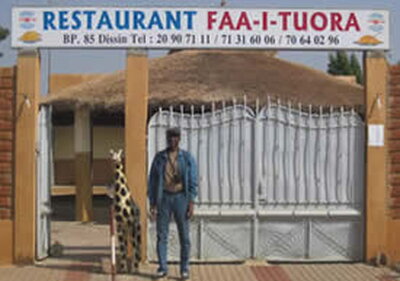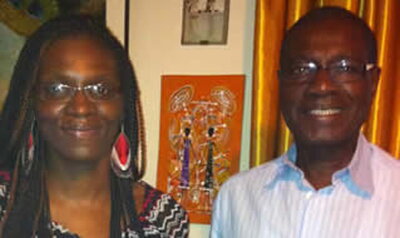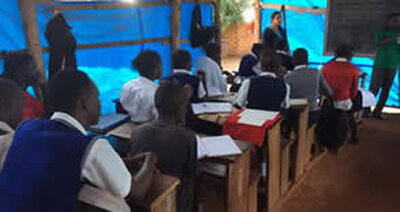
Language contact in two border communities in Burkina Faso and Ghana: Lexical borrowing in Dagara
Richard Beyoglé, PhD Candidate, Department of French

I conducted fieldwork for my doctoral research in two separate phases, during winter 2011 and summer 2012, at two border towns in Ghana (Hamile) and Burkina (Ouessa). The research was funded by Illinois’ School of Languages, Cultures and Literatures. It focuses on a homogenous (Dagara) language community that had been divided politically during the French and British partitioning of Africa. Briefly, Dagara is a language spoken in the northwestern corner of Ghana, the southwestern part of Burkina Faso, and the northeastern part of Côte d’Ivoire. This arbitrary partitioning of the Dagara people into these three West African countries created not only a political border, but also an artificial Anglophone and Francophone Dagara linguistic boundary due to the different language contact situations (Kyoore, 2009 and, Somé M., 1994), which border communities experience in their daily interactions, even when the speakers are referring to the same linguistic object. I had a very rewarding and productive field trip experience both as an insider and an outsider going to this part of West Africa to do a research.
The participants in the study were sampled randomly with the help of acquaintances from each side of the border. In all, 100 participants comprised of an equal number of males and females were interviewed. Each participant was interviewed in their native Dagara, with each interview lasting between 25 to 35 minutes.
My study attempts to contribute significantly to theories of borrowing that focus on border communities. Border community studies, as pointed out by Elizaincín (1976), describe the linguistic practices that result from the interactions between speech communities who speak different official languages. While I try to contribute to theories of borrowing, I hope to provide one of the windows through which other new theoretical perspectives relating to border language issues could be properly addressed. Future sociolinguistic research on border language phenomenon is needed to bring more insight on the applicability of some of the theoretical models regarding current lexical borrowing patterns. Also, since this research is among very few, if not the first, study that focuses on lexical borrowing at border regions in West Africa, the results cannot be over generalized. My findings show that the border communities in my study did not borrow only from French and English, but also from other West African languages of higher instrumental values. More research is needed that focuses on such multilingual communities.
Decolonizing Autobiographies: Narratives of Détour by African Diasporic Women
Hapsatou Wane, PhD Candidate, Department of Comparative and World Literature

Hapsatou Wane and Mr. Sada Kane, Host of Impressions and Editor-in-chief at 2STV
In the summer of 2013, supported by the Gendell Family and Shiner Family fellowship, I was able to travel to Senegal to conduct research in preparation of my doctoral project, “Decolonizing Autobiographies: Narratives of Détour by African Diasporic Women.” This dissertation focuses on fictional autobiographies written by women from Senegal, South Africa, Guadeloupe, and Brazil. Such a wide geographical and cultural scope calls for an exploration of diverse literary traditions within the theoretical entanglements of postcolonial studies, diaspora studies, and genre criticism.
With this objective in mind, I planned my research travel to Dakar, Senegal to collect data on contemporary francophone African and Caribbean women writings. As I am familiar with the libraries of the Université Cheikh Anta Diop in Dakar and the Université Gaston Berger in Saint-Louis, Senegal, I focused my research in commercial venues such as the Institut Français Léopold Sédar Senghor, the Goethe-Institut, and the Athena Bookstore in Dakar because they carry more recent materials than the college libraries. Indeed, the Institut Français Léopold Sédar Senghor holds an exhaustive and updated multimedia library shared with other French Institutes all over the world. In addition, such venues organize events such as conference panels, book signings, and literary series that gather a broad audience. At those events, it was interesting to see the premises of a future Senegalese literature inscribed within a global postcolonial framework with fresh theoretical and conceptual avenues of research. For example, the panel on “Les études postcoloniales et la longue durée de l’histoire africaine,” featuring historians Achille Mbembe and Ibrahim Thioub as part of “La Conférence des grands témoins,” sponsored by Tandem Paris Dakar 2013, was on the appropriation of the concept of “longue durée” to challenge previous scholarship on postcolonial temporalities and experiences in an African context.
Furthermore, many of these events gave Senegalese writers the opportunity to express their views on issues at stake in contemporary Senegalese literature. At his book signing, the Senegalese writer Boubacar B. Diop offered his take on a genre approach to Senegalese literature while explaining why he chose the semi-autobiographical genre to engage with political, cultural, and social issues in La nuit de l’Imoko. During the literary series, “Au Coeur de la littérature,” at the Goethe-Institut, Fama D. Sene shared her thoughts on questions of return and migration at the core of her new novel.
Yet, the highlight of my fieldwork was my meeting with the literary journalist Sada Kane, host of two TV cultural programs on national television. Kane has interviewed the likes of Leopold Sedar Senghor, Cheikh Hamidou Kane, and many others and I was much honored to spend hours with him conversing on the current condition of Senegalese literature. He graciously invited me to participate in his TV program, “Impressions,” in order to introduce Afro-Brazilian literature to a Senegalese audience. Meeting with Sada Kane was particularly helpful for while prepping for the episode, we went over the connections between Afro-Brazilian and African literary and cultural practices. He shared his extensive library and knowledge of francophone African literature to help me bridge two different literary traditions.
When back to Champaign, I had enough material to situate Senegalese contemporary women writings within a global postcolonial framework. Having experienced firsthand the value of fieldwork and due to the lack of theoretical material in English on postcolonial theory and Afro-Brazilian literature, I realized that I would need to go to Brazil for my work on Afro-Brazilian literary tradition. Supported by the Center for Latin American and Caribbean Studies and the Lemann Institute for Brazilian Studies, I will therefore conduct a four-week research in Rio de Janeiro, Brazil in October 2014. I plan to consult the exhaustive resources on Afro-Brazilian literature available at the Biblioteca Nacional do Brazil and the Núcleo Interdisciplinar de Reflexão e Memória Afrodescendente. I will also meet with faculty at the Pontifical Catholic University of Rio de Janeiro. I am particularly excited to collaborate with Professor Eduardo Countinho, a prominent figure in comparative literature at the Federal University of Rio de Janeiro, Brazil, who fostered my interest in Afro-Brazilian literature when he came to the University of Illinois as the Lemann Distinguised Visiting Chair in Brazilian Studies in 2011. My doctoral dissertation immensely benefitted from my fieldwork in Senegal. I realized that effective research in the field of world literature combines conservative literary archival work with more innovative field research such as meeting with cultural agents such as writers and journalists and attending literary series. This work enlivened my dissertation by providing a fresh and updated insight into Senegalese literary tradition and offering new comparative and intersecting grounds between Brazilian and Senegalese literatures. Based on this work, I also noticed how more and more contemporary African women writers resort to short stories in order to represent their fragmented and multi-faceted diasporic/migrant identities. This is a new genre approach to global African women writings that I will investigate in future research projects.
Community Self-Determination in South Sudan
Tarnjeet K. Kang, PhD Student, Education Policy, Organization & Leadership
In the summer of 2014, I was able to travel to South Sudan for the first time to conduct fieldwork. My research focuses on community self-determination in South Sudan; essentially, it attempts to capture the way in which the South Sudanese people have been able to meet their own needs in education. Community-founded schools face many challenges: their students may struggle to pay school fees, and teachers’ salaries are not always received from the government, which makes covering operating costs difficult at times. They also struggle to access grants and support from both international organizations and the national government. Additionally, South Sudan faces low enrollment and school completion rates, particularly for female youth. These are challenges that have been present historically, and while literature has been produced on South Sudan, both in academia and in international development, there has not been a concerted effort to understand how the people of the country have mobilized to meet their own needs. They have done this through paying school fees, clearing land for schools to be built, founding schools, building classrooms, and even paying teachers’ salaries.

It is estimated that 80% of South Sudan’s social services, including education and healthcare, are provided by NGOs. Statistics that describe the dependency found in development and international aid often overshadow the work that is being done at the community level. This is particularly evident in South Sudan, where many of the people I encountered appeared to be skeptical of the success and quality of community-founded schools,
During my time there I was able to visit community-based schools. A secondary school that I visited in the western part of the country has managed to enroll more girls than boys in its school, which may be an unparalleled feat in South Sudan. They have also managed to enroll an increasing number of female students in their science track. This school was founded by six community members, and has been sustained through their own salaries and minimal school fees. They make a concerted effort to create a welcoming and nurturing environment, and encourage young girls to return to school even after having a child, getting married, or dropping out. In the eastern part of South Sudan I was able to meet the founder of a primary school. The school was originally founded by community members, and began under a tree in their family’s compound. Today, the school is ranked the top school in its state based on student performance.
The discrepancy between what research shows and what is happening on the ground highlights the importance of doing fieldwork, and also of developing research methodologies that allow us to be flexible in our research questions, design, and analysis, as we learn in the field. The case studies that I observed illustrate the need to record and research not only the challenges that South Sudan faces in its education system, but also the success stories that can inform future programs and policies.